Months after they were promised, Ottawa still hasn't imposed sanctions on violent Israeli settlers
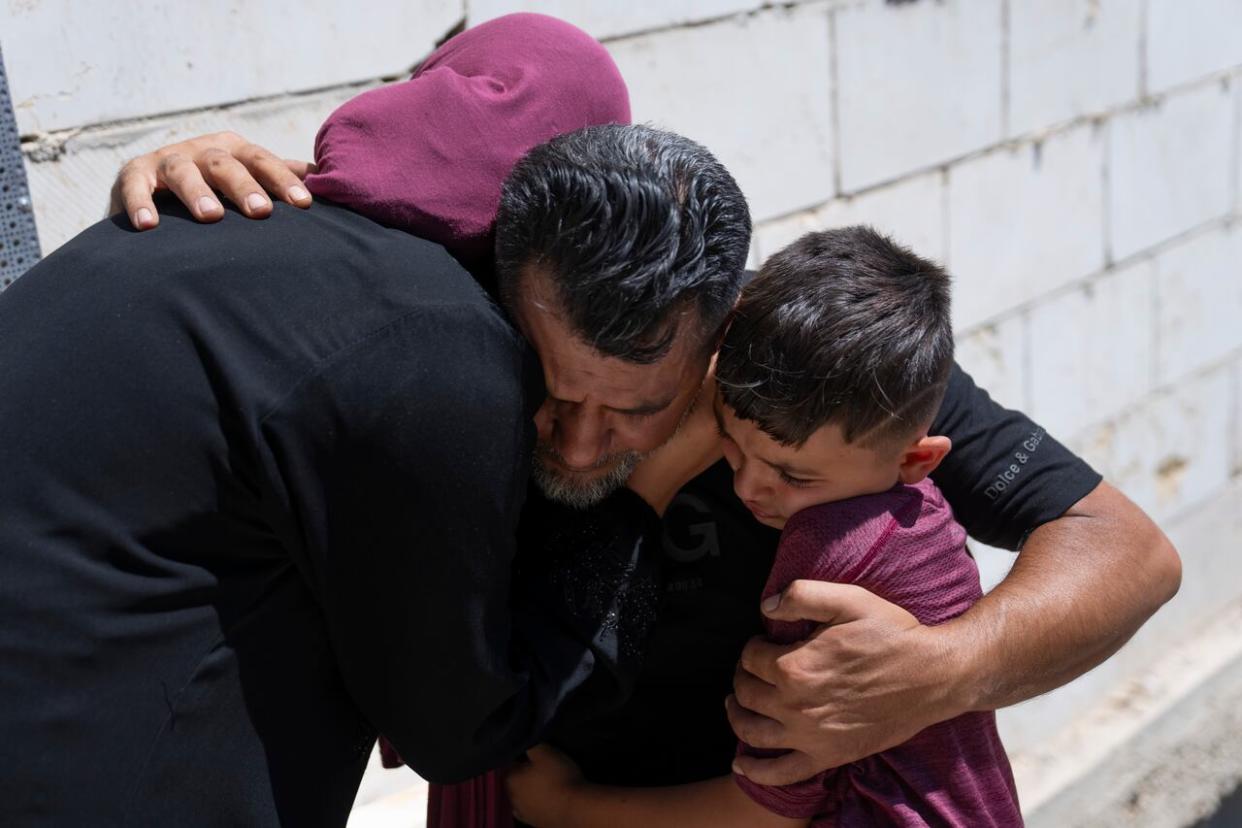
The Government of Canada has announced multiple rounds of sanctions against various parties in the Middle East since October 7. On Friday, Foreign Affairs Minister Mélanie Joly announced sanctions against Iran's minister of defence and its general staff.
On February 3, she announced that Canada would impose sanctions on both leaders of Hamas involved in the October 7 massacre and extremist Israeli settlers involved in violent attacks on Palestinian civilians in the West Bank.
But there's an important difference between the sanctions announced against Palestinians and Iranians and the ones announced against Israelis — the ones against Israelis have not been gazetted and therefore never took effect.
Joly was asked Friday afternoon why Global Affairs only proceeded with the sanctions against Palestinians.
"We will be imposing sanctions on Israeli settlers," she replied. "We've said it and we'll do it."
Asked for a timeline, she said only that "it will be coming."
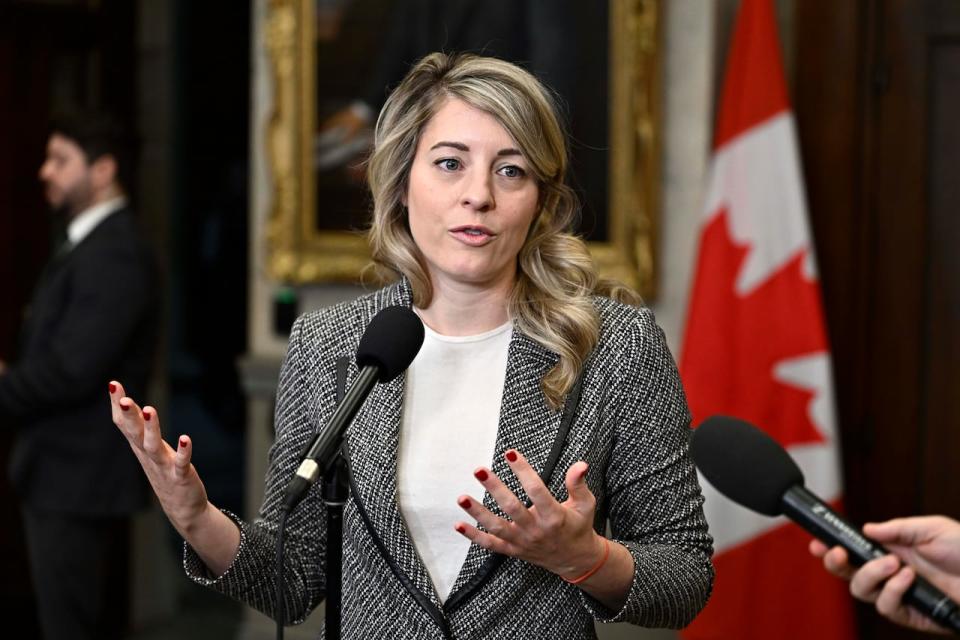
Minister of Foreign Affairs Melanie Joly had said promised sanctions on violent Israeli settlers are still on the way. (Justin Tang/The Canadian Press)
At the time the sanctions against extremist settlers were announced, Joly said her officials were "actively working on it."
"Settler violence in the West Bank is absolutely unacceptable and puts at risk peace [and] stability in the region, and the path toward the two-state solution that is absolutely essential," Prime Minister Justin Trudeau said at the time.
"We will be sanctioning extremist settlers and we will also bring new sanctions on Hamas leaders," Joly told CBC's Rosemary Barton Live. "I look forward to doing announcements soon."
The sanctions against 11 Palestinians had been gazetted the day before and had already taken effect, but the sanctions against Israelis were not and never moved past the announcement stage.
Playing catch-up
Canada was already playing catch-up with allies when it announced the sanctions. The Biden administration had already imposed a visa ban on some violent settlers two months earlier, as had the U.K.
The Trudeau government did not follow suit, despite a written request from the NDP to do so.
On February 1, the U.S. followed up with its first financial sanctions on settlers "directing or participating in acts or threats of violence against civilians, intimidation of civilians to cause them to leave their homes, destruction or seizure of property, or terrorist activity in the West Bank."
"Israel must do more to stop violence against civilians in the West Bank and hold accountable those responsible for it," the U.S. State Department warned.
Six weeks later, the U.S. imposed further sanctions against individuals and two notoriously violent settlements known as Moshe's Farm and Zvi's Farm.
A week ago, U.S. President Joe Biden's administration went further by sanctioning two groups that raise funds for illegal settlements and settler leader Ben-Zion Gopstein, leader of the so-called "anti-assimilation" Jewish supremacist group Lehava.
Lehava adovcates against mixed marriages and social contact between Arabs and Jews, which it calls "the dangerous cancer of coexistence."
Gopstein, whose salary has at times been paid by the Government of Israel, has led campaigns to urge Israeli businesses to employ only Jews and has issued "kosher certificates" to those that do. It also seeks to shame Jewish landlords who rent space to Arab tenants.
Gopstein is a friend and close adviser to Israel's National Security Minister Itamar Ben Gvir, who also has acted as Gopstein's lawyer. The sanctions against him were seen by some as a warning to the Netanyahu government that its most radical members could be next.
Last Sunday, the sanctions led to Gopstein's credit card being rejected at an Israeli gas station.
Sanctions lose their teeth
The American sanctions have been criticized by some, including former U.S. officials, as weak and ineffectual. They were further weakened at the end of March when, according to the Israeli newspaper Israel Hayom, the State Department backed down in the face of a threat by Israeli Finance Minister (and West Bank settler) Bezalel Smotrich to retaliate with actions against Palestinian banks.
"A great achievement for Israel," reported the paper. "The American folding comes in the wake of Finance Minister Bezalel Smotrich's threat to collapse the Palestinian economy."
The U.S. decision to allow the sanctioned settlers to use their bank accounts put an end to the substantive part of the sanctions against them.
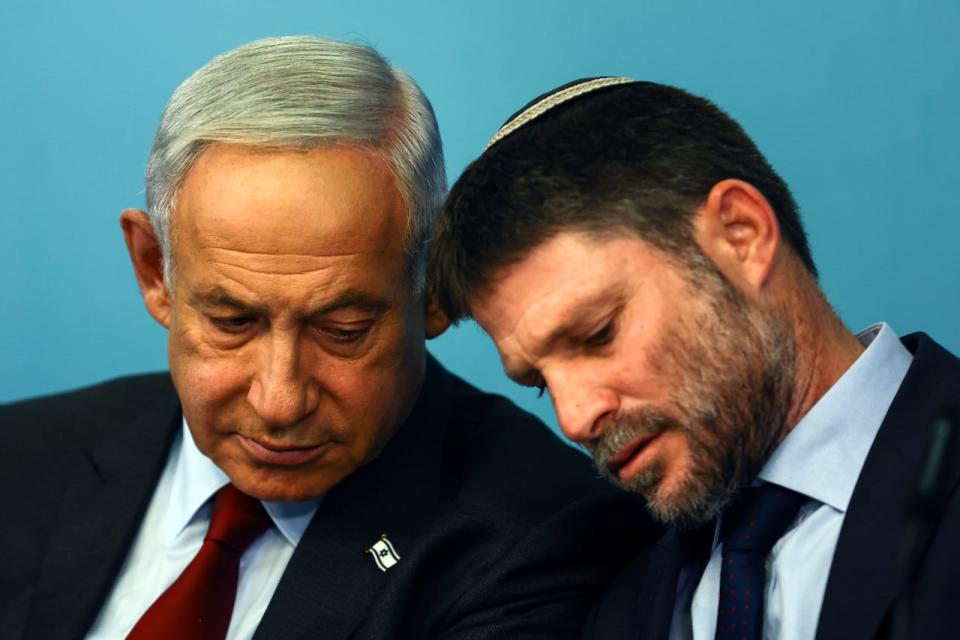
Israeli Prime Minister Benjamin Netanyahu and Israeli Finance Minister Bezalel Smotrich hold a news conference at the prime minister's office in Jerusalem on Wednesday, Jan. 25, 2023. (Ronen Zvulun/The Associated Press)
The Biden administration also let it be known this month that it is drawing up plans to reverse a Trump-era policy that allowed goods made in West Bank settlements to be labelled "Made in Israel."
The Trudeau government, meanwhile, has overruled the Canadian Food Inspection Agency and has even gone to court to defend the right of Israeli settlements to label their products "Made in Israel."
Israel looks to legalize more settlements
Tensions between the U.S. and Israel over settlements seem likely to get worse as the Israeli cabinet weighs a demand by Smotrich to formalize the status of 68 settlements built without authorization and currently considered illegal by the Israeli government.
Many of the outposts are merely plywood shacks placed on hilltops by a radical fringe of the settler movement closely associated with two key cabinet ministers: Smotrich and Ben Gvir.
Their purpose is to establish facts on the ground that obstruct any move toward a two-state solution, and they often also serve to create a pretext for the IDF to declare security zones and confiscate Palestinian land around them.
U.S. State Department spokesperson Vedant Patel on Thursday described the proposal as "reckless and dangerous."
Ottawa has not commented on the proposal.
A steep escalation in attacks
The escalation in settler attacks, and in killings of Palestinians in the West Bank by Israeli soldiers and police, began several months before October 7, 2023 and dates back to the arrival in power of the current Netanyahu government the previous December.
In order to form a coalition, Israeli Prime Minister Benjamin Netanyahu joined with two extremist parties led by West Bank settlers Ben Gvir and Smotrich, who demanded key offices in exchange for their support.
The two men essentially control all Israeli operations in the West Bank except for those of the IDF, which is under Defence Minister Yoav Gallant. Smotrich demanded powers of decision and appointment previously held by the defence minister.
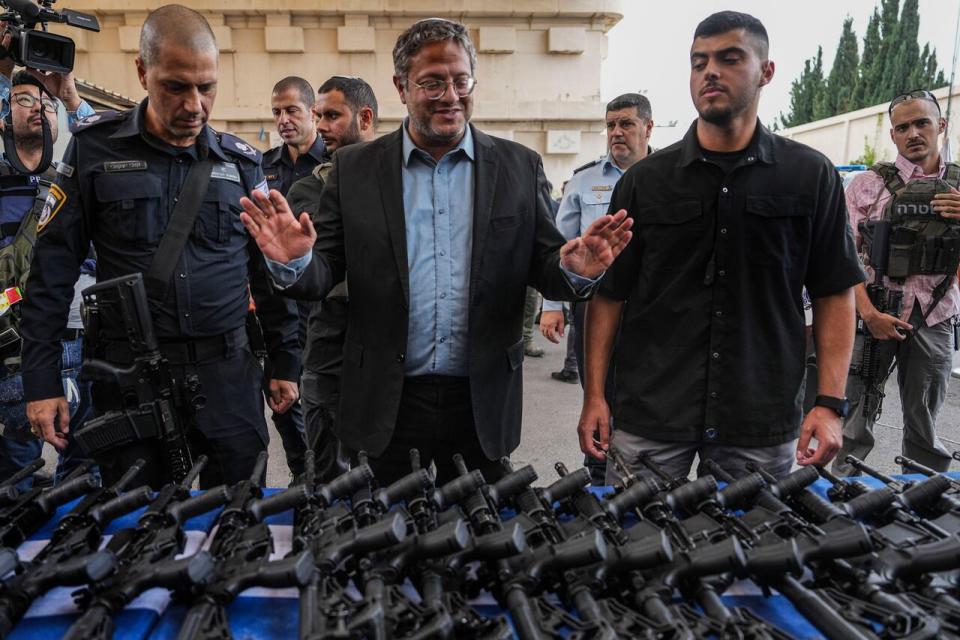
Israel's National Security Minister Itamar Ben-Gvir attends an event to deliver weapons to local volunteer security group members in Ashkelon, Israel on Friday, Oct. 27, 2023. (Tsafrir Abayov/The Associated Press)
The coalition agreement included the formation of a new Settlements Administration under Smotrich's control.
Former IDF chief Benny Gantz — a rival of Benjamin Netanyahu for the country's leadership — called the deal "a decision that will rip apart the chain of command, harm the security of Israeli citizens and our international standing."
"May every Hebrew mother know that the fate of her son and our security has been forfeited to irresponsible politicians," he warned.
Ben Gvir has also used his control of Israel's police and border police to assist settlers by helping them evade legal consequences and creating a special police unit to arrest Israeli and international rights activists who try to document attacks on Palestinians in the West Bank.
Last year was the deadliest year for Palestinians in the West Bank in two decades, with over 500 killed, compared to 151 in 2022.
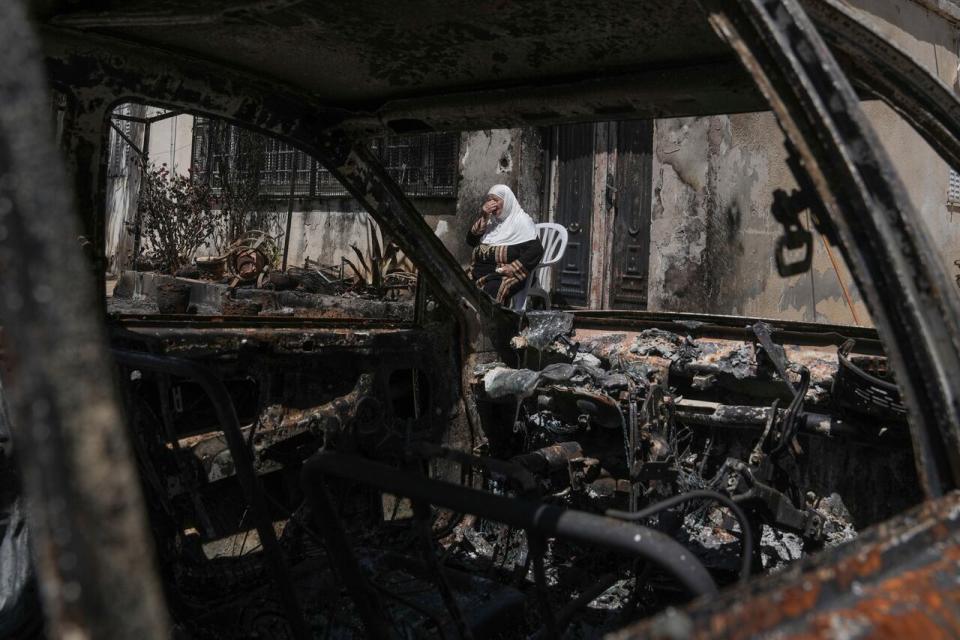
A Palestinian woman sits outside her torched home, days after it was set on fire by Jewish settlers, in the West Bank town of Turmus Ayya on Saturday, June 24, 2023. Israeli settlers entered the town, setting fire to Palestinian cars and homes after four Israelis were killed by Palestinian gunmen in the northern West Bank on Tuesday. (Mahmoud Illean/Associated Press)
Since its arrival in office in 2015, the Trudeau government has consistently voted against the annual UN motion that calls for the Fourth Geneva Convention to be upheld in the Occupied Territories and for settlement construction to cease.
The Trudeau government also has written to the International Criminal Court at The Hague saying that Canada, as one of the nations funding the court, wants it to reject all cases brought against Israel by Palestinians. The last of those letters was sent on February 14, 2020 in response to a request from Netanyahu.
In July 2023, as Israeli settler violence reached a boiling point, the Trudeau government also wrote to the International Court of Justice pressing it to refuse to issue "an advisory opinion on Israeli practices in the occupied territories," as requested by the UN General Assembly.
Canada's lawyers told the court it should reject the case because Israel did not recognize its jurisdiction, and because "Canada is concerned that the issuance of an advisory opinion on Israeli practices in the occupied territories may contribute to a polarization of positions."
The government also has allowed Israeli settlements to raise funds in Canada and claim Canadian tax refunds.

